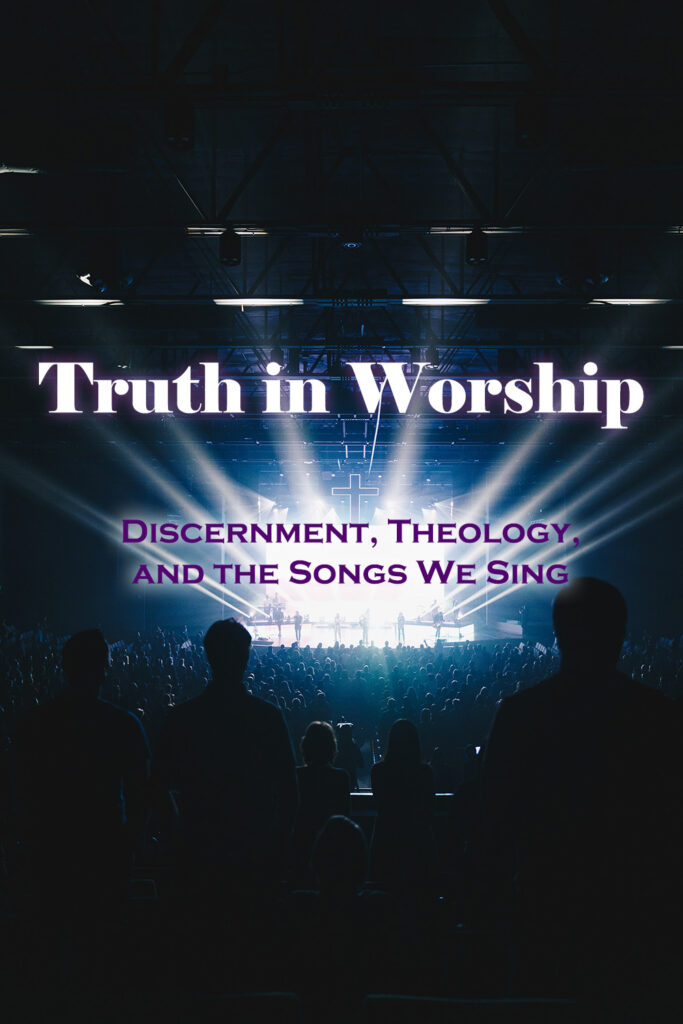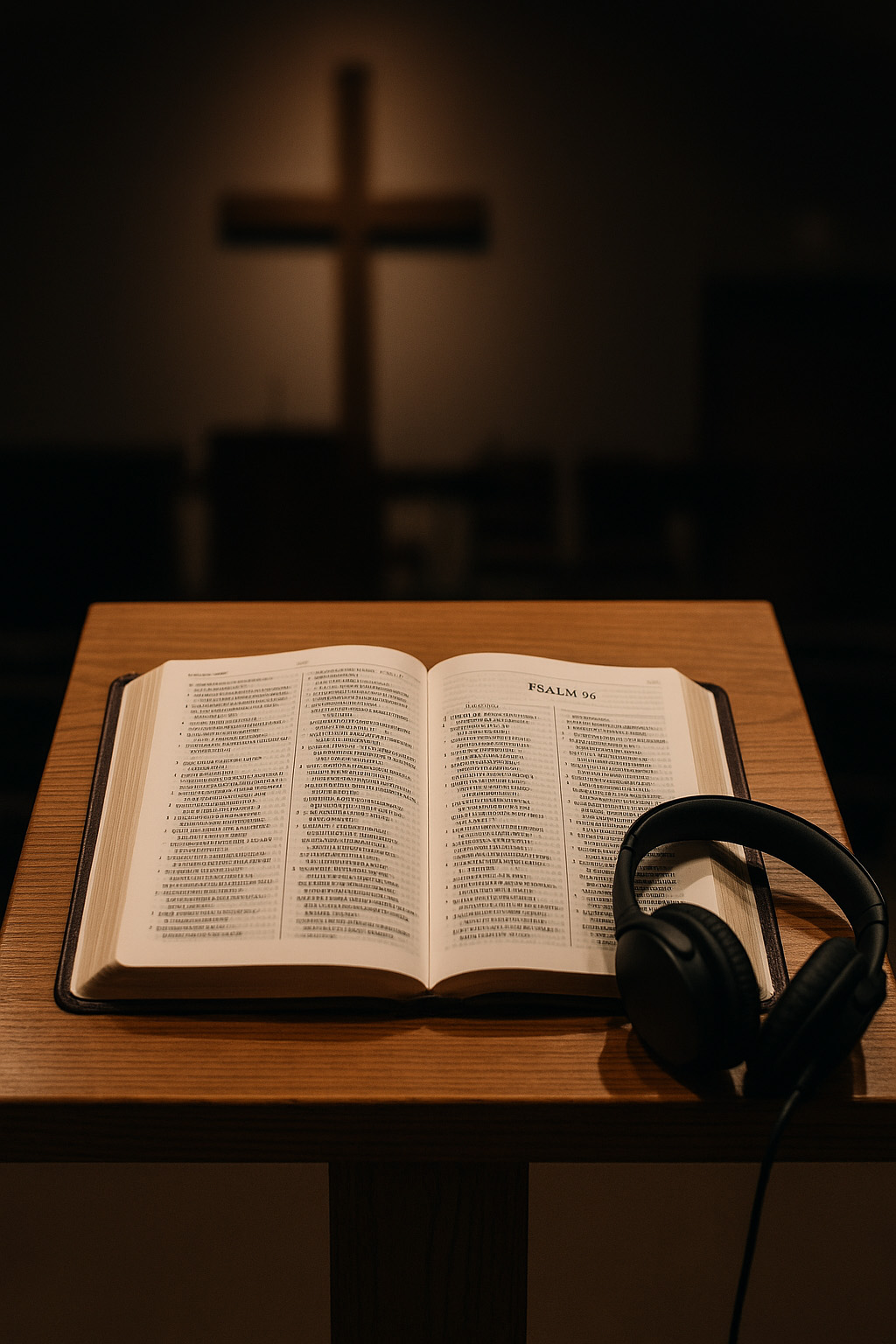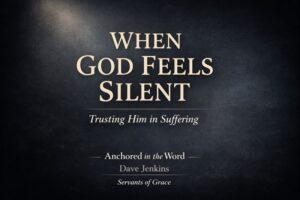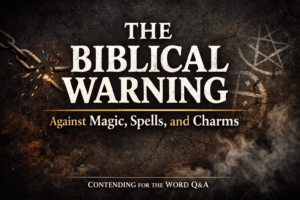⏱️ Estimated Reading Time: 8 min read
Start with the Word: Why Daily Bible Reading Shapes Discernment in Worship
By Dave Jenkins
In a world awash with emotionalism, experience-driven faith, and theological confusion, the Church must re-anchor itself in the Word of God—especially when it comes to worship. While conversations about worship often center around music preferences, lighting, or style, the deeper issue is one of discernment. And discernment starts not on a stage, but in Scripture.
Daily Bible reading isn’t merely a spiritual discipline for private edification—it is the foundation for developing theological clarity, cultivating spiritual maturity, and aligning the affections of our hearts with the revealed will of God. Worship that pleases the Lord flows from hearts transformed by truth. If we want to sing what is true, and worship in spirit and in truth, we must start with the Word.
The Centrality of the Word in Worship
Worship is not left to human invention. From the tabernacle to the temple, and from the Psalms to Paul’s epistles, we see that God regulates worship by His Word.
Jesus said in John 4:24, “God is spirit, and those who worship him must worship in spirit and truth.” That word “must” is not optional. Worship is only acceptable to God when it is both spiritually authentic and anchored in truth. Consider the language of Romans 12:1–2, where Paul urges believers to “present your bodies as a living sacrifice, holy and acceptable to God, which is your spiritual worship.” But how is that done? The answer is in verse 2: “Do not be conformed to this world, but be transformed by the renewal of your mind.” Renewal comes from the Word.
Likewise, Colossians 3:16 connects the Word of Christ dwelling richly in us with the practice of worship: “…teaching and admonishing one another in all wisdom, singing psalms and hymns and spiritual songs.” If the Word is absent, worship becomes sentiment. If the Word is central, worship becomes substance.
Daily Bible Reading Trains the Mind and Tunes the Heart
You can’t separate daily discipleship from corporate worship. The believer who lives in the Word throughout the week is better equipped to discern what is sung and said on Sunday.
Hebrews 5:14 states, “But solid food is for the mature, for those who have their powers of discernment trained by constant practice to distinguish good from evil.” Daily Bible intake is how believers train themselves to spot error, sift truth, and evaluate theology—whether from a sermon or a song lyric. The Bible doesn’t just shape your knowledge; it tunes your heart. It reshapes your affections toward what God loves. This is how we learn to delight in truth, reject flattery disguised as worship, and embrace the weight of holiness.
Case Study: Psalm 119 and the Word-Saturated Worshipper
Psalm 119 is the longest chapter in the Bible and a rich example of how love for the Word shapes every part of life—including worship.
- “Your statutes have been my songs in the house of my sojourning” (v. 54).
- “Let my lips overflow with praise, for you teach me your statutes” (v. 171).
- “I will praise you with an upright heart, when I learn your righteous rules” (v. 7).
The psalmist’s praise flows from knowledge. His worship is the overflow of truth, not the pursuit of feeling. This is the fruit of daily meditation on God’s Word.
A Defense Against False Teaching in Worship
One of the most dangerous avenues for theological error today isn’t the pulpit—it’s the platform. Worship music has become a theological battleground. Music industry giants like Bethel Music, Elevation Worship, and Hillsong have introduced doctrinal confusion to the Church through emotionally powerful songs that often lack biblical clarity or subtly promote Word-Faith, prosperity, or New Apostolic Reformation theology. What makes this more dangerous is how unaware many Christians are. Because they haven’t been saturated in Scripture, they don’t recognize when a lyric is theologically off, spiritually manipulative, or doctrinally unsound.
Real-Life Example
A worship leader I spoke with recently shared how his song selection changed drastically after he returned to regular daily Bible reading. He said, “I realized I was picking songs based on how they made me feel, not what they actually said. Once I started spending time in the Word every morning, I could no longer sing lyrics that were shallow or misleading. My theology deepened—and so did the songs we sang.” This isn’t just anecdotal—it’s a reflection of spiritual reality. The Word sharpens discernment and guards the heart against error.
Daily Bible Reading Shapes the Worshipper Before the Worship
Too often we think of worship as something we start when we walk into church. But in truth, worship begins long before the service starts. True worship is the overflow of a life that is surrendered to the Lord, shaped by Scripture, and grounded in grace.
A heart that reads Scripture daily is a heart that comes to church already humbled, already stirred, already full of reverence. Without daily exposure to the Word, we risk walking into worship services cold, distracted, or self-focused.
As Jesus told Satan in Matthew 4:4, “Man shall not live by bread alone, but by every word that comes from the mouth of God.” If that’s how we live, it must also be how we worship.
The Testimony of Church History: Scripture Before Song
Throughout Church history, reformers and faithful shepherds have emphasized that worship must be regulated by God’s Word, not by the creative impulses of man.
- John Calvin wrote that worship should be limited to what is commanded in Scripture, lest we create idols in our image.
- The Puritans fiercely protected worship from innovation that lacked biblical warrant, often emphasizing Psalm-singing and Scripture-saturated lyrics.
- Jonathan Edwards warned that revival not grounded in the Word would eventually produce counterfeit emotionalism.
- Martyn Lloyd-Jones urged the Church to keep worship grounded in the truth of God’s revelation. He believed that “a revival that is not centered on the Word is a false revival.”
The lesson is clear: when the Word is central, worship is preserved. When the Word is neglected, worship decays.
The Modern Church: Word-Deprived Worshippers
The modern evangelical Church faces a crisis: biblical illiteracy is growing, while music ministries often chase trends instead of truth. This vacuum of biblical depth produces congregations that are easily swayed by performance, novelty, or celebrity worship culture. We need a radical return to Scripture-fed worshippers who evaluate lyrics like Bereans (Acts 17:11) and sing with both heart and mind (1 Corinthians 14:15). If Sunday worship is the only time a Christian engages with the Bible, they’re spiritually malnourished—and vulnerable to deception.
Practical Implications
Here are several takeaways for believers and church leaders.
For Church Members:
- Commit to daily Bible reading—not as legalism, but as spiritual formation.
- Let your time in the Word train you to love lyrics that are true, not just catchy.
- Ask weekly: Does what I sing align with what I read in Scripture?
For Worship Leaders:
- Prioritize biblical fidelity over emotional effect.
- Evaluate your song list through the lens of Scripture. Are you feeding the sheep or entertaining them?
- Encourage your team to be daily readers of the Word. A worship team that doesn’t read the Bible will eventually lead people away from it.
For Parents:
- Model daily Bible reading for your children.
- Help them understand the connection between knowing God’s Word and worshipping Him rightly.
Conclusion
Worship that honors God doesn’t begin with a chord or a lyric—it begins in the heart of the believer, shaped by the truth of God’s Word. If we want worship that is theologically sound, spiritually rich, and Christ-exalting, then we must build our lives on Scripture.
Start with the Word. Before we critique songs, assess churches, or define biblical worship, we must open our Bibles, hear from God, and let His truth train our hearts. When the Word dwells richly in us, our worship will rise faithfully to Him.
In what ways is your daily Bible reading shaping your understanding of God—and how you worship Him? Many ask, “Why does daily Bible-reading matter for worship?” It’s because it trains our discernment, shapes our affections, and grounds our worship in God’s revealed truth—not our feelings.
Looking for a Daily Bible Reading Companion?
If you want to grow in discernment and cultivate worship that pleases the Lord, the first step is to open the Word daily. Tune in to Reading the Bible Daily with Dave, a podcast designed to help you understand Scripture in context, explore sound theology, and apply God’s Word to every area of life. This podcast can be found at: https://servantsofgrace.org/reading-the-bible-daily-with-dave/ and is also available on Apple Podcasts, Spotify, and YouTube.




